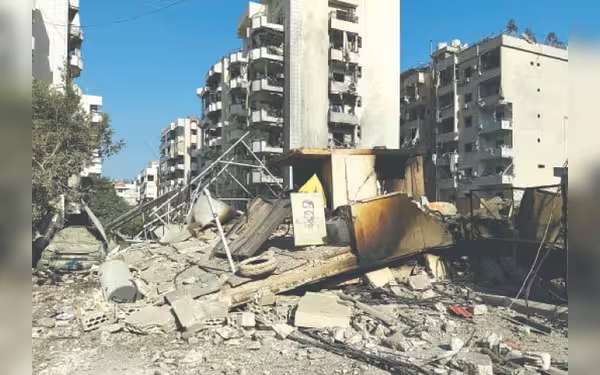Saturday, November 16, 2024 05:40 PM
Hezbollah Open to Truce Negotiations Amid Ongoing Conflict
- Hezbollah's deputy leader supports truce negotiations with Israel.
- Military capabilities remain intact despite Israeli strikes.
- Iran's Foreign Minister to discuss violence prevention strategies.
 Image Credits: dawn
Image Credits: dawnHezbollah's deputy leader expresses openness to truce negotiations with Israel amid ongoing conflict and military operations.
In recent weeks, the situation in Lebanon has escalated significantly, particularly following Israeli air strikes that have left entire blocks of apartment buildings in ruins. The conflict has drawn international attention, with Hezbollah, a prominent political and military group in Lebanon, making headlines for its stance on a potential ceasefire with Israel.
On Tuesday, Hezbollah's deputy leader, Naim Qassem, addressed the nation, indicating that the group is open to negotiating a truce with Israel. This marks a notable shift in their rhetoric, as Qassem did not mention a ceasefire in Gaza as a prerequisite for halting combat along the Lebanon-Israel border. Instead, he expressed support for the efforts of Speaker of Parliament Nabih Berri, a Hezbollah ally, to secure a cessation of hostilities.
During his 30-minute televised speech, Qassem emphasized that Hezbollah's military capabilities remain "intact" despite suffering "painful blows" from Israeli forces. He asserted, "We are striking them. We are hurting them and we will prolong the time," highlighting the group's confidence in its missile range and operational readiness. This statement underscores Hezbollah's determination to continue its military activities while exploring diplomatic avenues for peace.
Qassem's comments suggest a complex dynamic at play, as he described the conflict with Israel as a "war about who cries first," indicating a psychological aspect to the ongoing hostilities. He further stated, "If the enemy (Israel) continues its war, then the battlefield will decide," suggesting that Hezbollah is prepared for prolonged engagement if necessary.
Meanwhile, Iran's Foreign Minister, Abbas Araqchi, is set to visit Saudi Arabia and other Middle Eastern countries to discuss strategies aimed at preventing further violence in Lebanon, which he described as a continuation of the "shameless crimes of the Zionist regime in Gaza." This visit highlights the broader regional implications of the conflict and the interconnectedness of various actors in the Middle East.
On the ground, Israeli military operations in Lebanon have been expanding, with the Israeli military conducting "limited, localized, targeted operations" in the southwest of the country. This escalation has raised alarms among international organizations, including the United Nations, which has called for urgent action to prevent the conflict from spiraling into a humanitarian crisis similar to that witnessed in Gaza.
Matthew Hollingworth, director for the United Nations World Food Programme in Lebanon, expressed deep concern over the potential for devastation, stating, "We need to do everything we can to stop that from happening." His remarks reflect the urgency of the situation, as many people in Lebanon are fleeing their homes, haunted by the memories of destruction they have witnessed over the past year.
As the conflict continues to unfold, the international community watches closely, hoping for a resolution that can bring peace to the region. The situation remains fluid, and the potential for further escalation looms large. It is crucial for all parties involved to prioritize dialogue and diplomacy to prevent a repeat of the tragic events that have unfolded in Gaza. The people of Lebanon, like those in Gaza, deserve a chance to live in peace and security, free from the specter of war.













